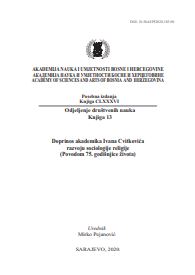WHY DO POLITICAL ELITES FRACTURE? THE UNUSUAL CASE OF THE YUGOSLAV COMMUNIST ELITE
WHY DO POLITICAL ELITES FRACTURE? THE UNUSUAL CASE OF THE YUGOSLAV COMMUNIST ELITE
Author(s): Sergej Flere
Subject(s): Political history, Social history, Recent History (1900 till today), Politics and religion, History of Communism, Sociology of Religion
Published by: Akademija Nauka i Umjetnosti Bosne i Hercegovine
Keywords: Ivan Cvitković; sociology; religion; political elites; Yugoslavia; communism;
Summary/Abstract: One is on slippery grounds attempting to study closely societal elites in manner to coincide with the elementary meaning of the term. Classical thinkers, Pareto and Mosca, with daring analyses, remain cited today (see, for example, Dogan 2003; Burton – Higley 2001; Best – Higley 2010: 1), although the formers’ constructs were hardly based on empirical findings, but were primarily the product of their “sociological imagination”. Hence, the troubles confronted at analysing the elite are illustrated by Giddens (1974: 2): “there can exist a ‘governing class’ without necessarily being a ‘ruling class’; there can exist a ‘power elite’ without necessarily being either a ‘ruling’ or a ‘governing class’” and he continues to denote terms which do not coincide in depiction of power elites. As to the “doctrine”, elites invoke, not only for the “ideocratic ones”, but in general, Burton and Higley (2001: 186) hold a Paretian view: “Doctrinal unanimity is always more apparent than real.” They also do not propose an operative definition of political elite’s structure: “Political elites are somewhat elastic formations with unclear boundaries” (2001: 182). This complements the words of Mattei Dogan, another authoritative source on elites, who wrote: “Elite studies seem to be shut to a conceptual Tower of Babel, where scholars gamble with non-specified words” (Dogan 2003: 6).
Book: DOPRINOS AKADEMIKA IVANA CVITKOVIĆA RAZVOJU SOCIOLOGIJE RELIGIJE (POVODOM 75. GODIŠNJICE ŽIVOTA)
- Page Range: 85-98
- Page Count: 14
- Publication Year: 2020
- Language: English
- Content File-PDF

